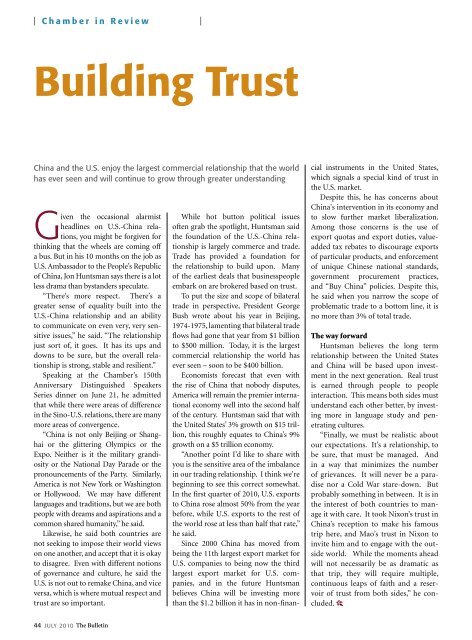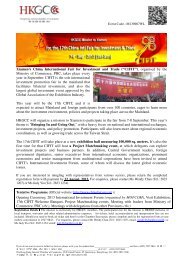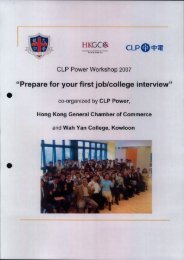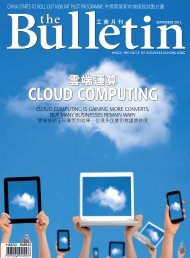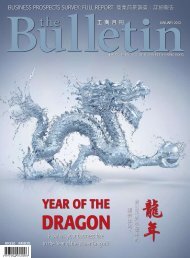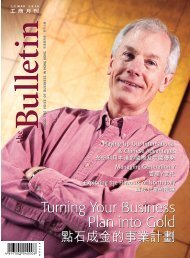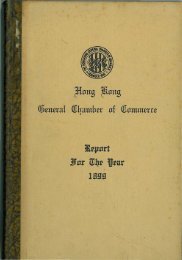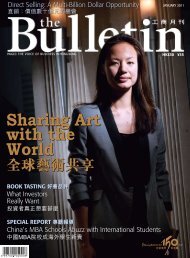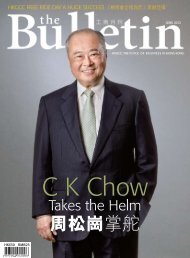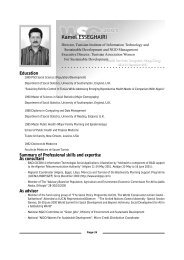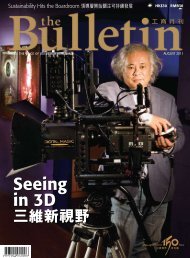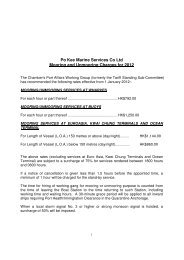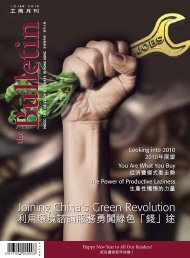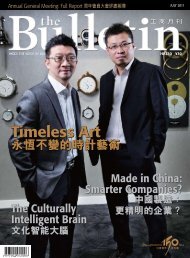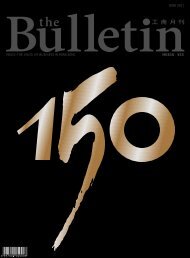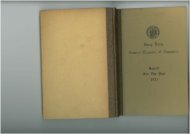2010å¹´7æ - The Hong Kong General Chamber of Commerce
2010å¹´7æ - The Hong Kong General Chamber of Commerce
2010å¹´7æ - The Hong Kong General Chamber of Commerce
You also want an ePaper? Increase the reach of your titles
YUMPU automatically turns print PDFs into web optimized ePapers that Google loves.
| <strong>Chamber</strong> in Review 活 動 重 溫 |<br />
Building Trust<br />
建 立 互 信<br />
China and the U.S. enjoy the largest commercial relationship that the world<br />
has ever seen and will continue to grow through greater understanding<br />
中 國 與 美 國 開 展 了 前 所 未 見 的 密 切 經 貿 關 係 , 兩 國 並 將 通 過 更 深 入 的 了 解 , 繼 續 促 進 相 互 合 作<br />
Given the occasional alarmist<br />
headlines on U.S.-China relations,<br />
you might be forgiven for<br />
thinking that the wheels are coming <strong>of</strong>f<br />
a bus. But in his 10 months on the job as<br />
U.S. Ambassador to the People’s Republic<br />
<strong>of</strong> China, Jon Huntsman says there is a lot<br />
less drama than bystanders speculate.<br />
“<strong>The</strong>re’s more respect. <strong>The</strong>re’s a<br />
greater sense <strong>of</strong> equality built into the<br />
U.S.-China relationship and an ability<br />
to communicate on even very, very sensitive<br />
issues,” he said. “<strong>The</strong> relationship<br />
just sort <strong>of</strong>, it goes. It has its ups and<br />
downs to be sure, but the overall relationship<br />
is strong, stable and resilient.”<br />
Speaking at the <strong>Chamber</strong>’s 150th<br />
Anniversary Distinguished Speakers<br />
Series dinner on June 21, he admitted<br />
that while there were areas <strong>of</strong> difference<br />
in the Sino-U.S. relations, there are many<br />
more areas <strong>of</strong> convergence.<br />
“China is not only Beijing or Shanghai<br />
or the glittering Olympics or the<br />
Expo. Neither is it the military grandiosity<br />
or the National Day Parade or the<br />
pronouncements <strong>of</strong> the Party. Similarly,<br />
America is not New York or Washington<br />
or Hollywood. We may have different<br />
languages and traditions, but we are both<br />
people with dreams and aspirations and a<br />
common shared humanity,” he said.<br />
Likewise, he said both countries are<br />
not seeking to impose their world views<br />
on one another, and accept that it is okay<br />
to disagree. Even with different notions<br />
<strong>of</strong> governance and culture, he said the<br />
U.S. is not out to remake China, and vice<br />
versa, which is where mutual respect and<br />
trust are so important.<br />
While hot button political issues<br />
<strong>of</strong>ten grab the spotlight, Huntsman said<br />
the foundation <strong>of</strong> the U.S.-China relationship<br />
is largely commerce and trade.<br />
Trade has provided a foundation for<br />
the relationship to build upon. Many<br />
<strong>of</strong> the earliest deals that businesspeople<br />
embark on are brokered based on trust.<br />
To put the size and scope <strong>of</strong> bilateral<br />
trade in perspective, President George<br />
Bush wrote about his year in Beijing,<br />
1974-1975, lamenting that bilateral trade<br />
flows had gone that year from $1 billion<br />
to $500 million. Today, it is the largest<br />
commercial relationship the world has<br />
ever seen – soon to be $400 billion.<br />
Economists forecast that even with<br />
the rise <strong>of</strong> China that nobody disputes,<br />
America will remain the premier international<br />
economy well into the second half<br />
<strong>of</strong> the century. Huntsman said that with<br />
the United States’ 3% growth on $15 trillion,<br />
this roughly equates to China’s 9%<br />
growth on a $5 trillion economy.<br />
“Another point I’d like to share with<br />
you is the sensitive area <strong>of</strong> the imbalance<br />
in our trading relationship. I think we're<br />
beginning to see this correct somewhat.<br />
In the first quarter <strong>of</strong> 2010, U.S. exports<br />
to China rose almost 50% from the year<br />
before, while U.S. exports to the rest <strong>of</strong><br />
the world rose at less than half that rate,”<br />
he said.<br />
Since 2000 China has moved from<br />
being the 11th largest export market for<br />
U.S. companies to being now the third<br />
largest export market for U.S. companies,<br />
and in the future Huntsman<br />
believes China will be investing more<br />
than the $1.2 billion it has in non-financial<br />
instruments in the United States,<br />
which signals a special kind <strong>of</strong> trust in<br />
the U.S. market.<br />
Despite this, he has concerns about<br />
China's intervention in its economy and<br />
to slow further market liberalization.<br />
Among those concerns is the use <strong>of</strong><br />
export quotas and export duties, valueadded<br />
tax rebates to discourage exports<br />
<strong>of</strong> particular products, and enforcement<br />
<strong>of</strong> unique Chinese national standards,<br />
government procurement practices,<br />
and “Buy China” policies. Despite this,<br />
he said when you narrow the scope <strong>of</strong><br />
problematic trade to a bottom line, it is<br />
no more than 3% <strong>of</strong> total trade.<br />
<strong>The</strong> way forward<br />
Huntsman believes the long term<br />
relationship between the United States<br />
and China will be based upon investment<br />
in the next generation. Real trust<br />
is earned through people to people<br />
interaction. This means both sides must<br />
understand each other better, by investing<br />
more in language study and penetrating<br />
cultures.<br />
“Finally, we must be realistic about<br />
our expectations. It’s a relationship, to<br />
be sure, that must be managed. And<br />
in a way that minimizes the number<br />
<strong>of</strong> grievances. It will never be a paradise<br />
nor a Cold War stare-down. But<br />
probably something in between. It is in<br />
the interest <strong>of</strong> both countries to manage<br />
it with care. It took Nixon’s trust in<br />
China’s reception to make his famous<br />
trip here, and Mao’s trust in Nixon to<br />
invite him and to engage with the outside<br />
world. While the moments ahead<br />
will not necessarily be as dramatic as<br />
that trip, they will require multiple,<br />
continuous leaps <strong>of</strong> faith and a reservoir<br />
<strong>of</strong> trust from both sides,” he concluded.<br />
44 July 2010 <strong>The</strong> Bulletin 工 商 月 刊


